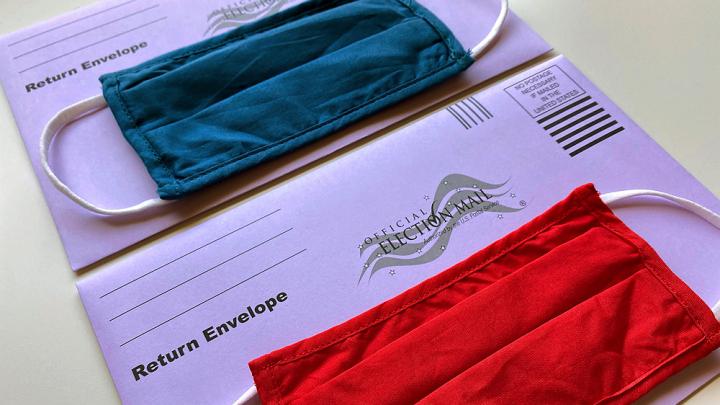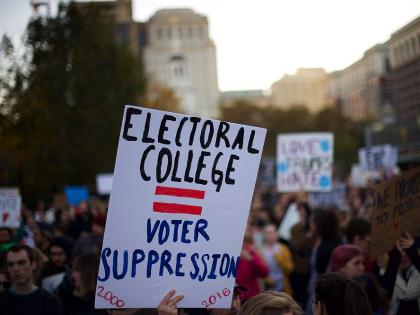How did mail-in voting, a practice that U.S. states have implemented for decades, become so polarized in a matter of months? A new report by a research team at Harvard’s Berkman Klein Center for Internet & Society argues that the myth that vote-by-mail is susceptible to widespread fraud has been propagated in a “coordinated disinformation campaign” by President Donald Trump and other Republican Party elites—not by the fringe internet actors commonly associated with “fake news.” Instead, the authors explain, the disinformation campaign led by the president has been reported by mass media outlets as though there were a legitimate debate over mail-in voter fraud, misleading the least politically engaged Americans about the security of vote-by-mail.
The study, which was led by Berkman professor of entrepreneurial legal studies Yochai Benkler, used data from 55,000 news stories, 5 million tweets, and 75,000 Facebook posts between March and August. The team’s conclusions are consistent with those made in the 2018 book Network Propaganda, in which Benkler and co-authors Robert Faris and Hal Roberts argued that “Fox News and Donald Trump’s own campaign were far more influential in spreading false beliefs than Russian trolls or Facebook clickbait artists. This dynamic appears to be even more pronounced in this election cycle,” the paper explains, “likely because Donald Trump’s position as president and his leadership of the Republican Party allow him to operate directly through political and media elites.”
Voter fraud, by mail or in person, is exceedingly rare. Congressional Democrats secured funding to help states implement large-scale voting by mail as part of the CARES Act, the coronavirus-relief legislation, in March. Trump soon began to agitate against mail-in voting on Twitter and in television appearances, the study notes; he appeared on Fox & Friends on March 30, stating that if voting were made easier and more widespread, “You’d never get a Republican elected in this country again.” On April 8, he tweeted, “Republicans should fight very hard when it comes to statewide mail-in voting. Democrats are clamoring for it. Tremendous potential for voter fraud, and for whatever reason, doesn’t work out well for Republicans.”
Trump’s Twitter account is central to the study’s analysis: “[M]ost of the peaks in coverage of mail-in voter fraud, across all media and social media, were driven by Donald Trump using a combination of his Twitter account, his press briefings, and his interviews on Fox News.”
“[T]he president’s efforts were supported by the communications teams of both the White House and his reelection campaign, by the Republican National Committee (RNC), and by other leading Republican officials at both the federal and state levels,” Benkler and his team point out. “The coordinated messaging suggests a strategic disinformation campaign.” They add later: “These propaganda efforts are integrated into an institutional and political strategy of litigation and administrative actions designed to prevent or contain mail-in voting, and to limit access to the ballot during the pandemic in the 2020 election. According to the president’s explicit statements in interviews, press conferences, and on Twitter, the strategy is designed to achieve partisan electoral advantage.”
The president’s strategy for gaining media attention relies on journalistic standards of objectivity and avoiding partisanship, which “limits the degree to which professional journalists in mass media organizations are willing or able to directly call the voter fraud frame disinformation,” the authors note. This makes the decisions of reporters and editors critical, particularly those at outlets where the least politically motivated, most persuadable voters get their news, including local TV, network TV, CNN, and the Associated Press, which syndicates news stories to the websites of many local television stations. The researchers found that, early in the disinformation campaign, these “centrist” news sources were precisely the ones that were more likely to frame stories about voter fraud as a disagreement between Republicans and Democrats. But by later in the summer, “more of the stories, including the syndicated stories, in either the headline or the lede, underscored that the president’s assertions were false.”
“In the coming months,” the authors conclude, “it will be critical for editors of these national and local media, particularly on the television stations trusted by the least politically pre-committed and often least politically attentive citizens, not to fall for the strategy that the president has used so skillfully in the past six months, not to capitulate to the inevitable charges of partisanship that will befall any journalists and editors who call the disinformation campaign by its name, and not to add confusion and uncertainty to their readers, viewers, and listeners by emphasizing false equivalents or diverting attention to exotic, but according to our research, peripheral actors like Facebook clickbait artists or Russian trolls.”









